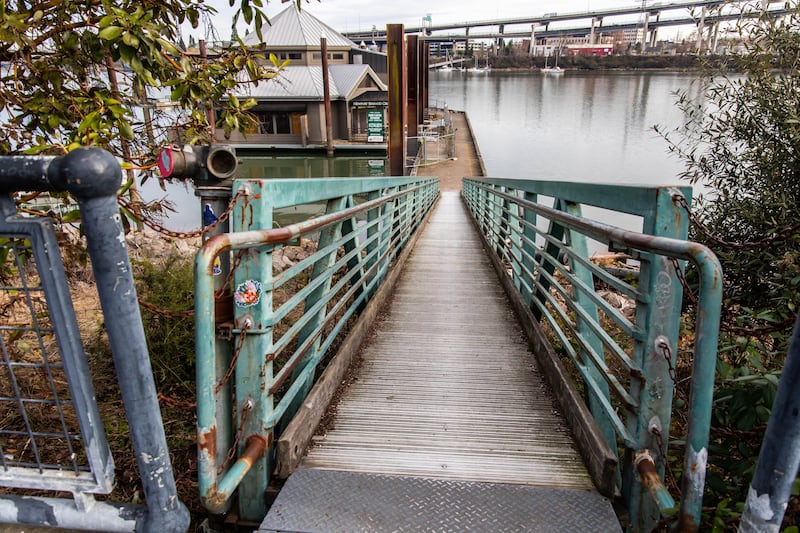It was not until after the 14th warning that the city of Portland finally towed the Rhône Ranger, a 33-foot white sailboat with blue trim, from a city dock along the Willamette River.
The boat, co-owned by Travis Nagels, had been docked there for about a year, along with six or seven other inhabited boats moored near a former floating restaurant that once sold overpriced clam chowder.
Nagels, 34, had received 13 notices telling him to move his boat. They’d so far been toothless, so Nagels ignored the 14th one, which arrived in September and warned that he had 10 days to move it or else the city would seize and tow it.
Portland Parks & Recreation ordered the tow of the sailboat nine business days later. That was one day too early, according to state law.
In December, the city hearings officer fined the parks bureau $10,000 for its misstep—and gave the check to nomadic mariner Nagels. The city could not give him his boat back: It had already been dismantled.
After the incident, the city stopped towing boats from the two docks altogether and is now trying to persuade the Multnomah County Sheriff’s Office to resume the job—which it is hesitant to do after the city took more than a year to pay for previous work.
What happened that October morning at Riverplace Marina was a farce featuring armed cops, frightened parks rangers, and the arrest of Nagels on a decade-old cannabis charge. It was also the result of a city that had neglected to enforce its own rules for so long that nobody took the rules seriously. In short, it was business as usual for Portland’s homelessness crisis, but this time on the water.

For more than five years, high-end renters near Riverplace Marina complained to the city of a smattering of boats whose mysterious owners illegally moored them at the two municipal docks. Neighbors called them “pirate hobos.”
“Over the years, I have watched the docks at RiverPlace change from family friendly places…to shanty towns of derelict boats taking all of the mooring space. I have observed multiple drug deals, fights and brawls, and the Parks docks being taken over by the possessions of those living on the derelict boats,” Connie Cavagnaro wrote to the Portland City Council in April 2017. “And I am tired of seeing human feces floating in the river.”
Susan West, who until just recently lived in a condo in a nearby high-rise, sent two photos to the City Council with a neatly handwrittem wrote: “Tom McCall would turn over in his grave.”
The Oregon Department of State Lands, which oversees the state’s publicly owned waterways, estimates hundreds of abandoned or derelict boats float on those waterways. But the craft that are inhabited? Those are more prevalent along the Willamette River, clustered specifically along the two docks at Riverplace Marina. The state doesn’t have an estimate of the number of inhabited boats.
“There’s easy access to land and there’s lots of little shops there,” says the department’s Ali Hansen, who adds that Riverplace is “a popular spot for people who are living aboard boats to congregate.”
Portland Parks & Recreation owns the Riverplace docks. Prior to 2020, the parks bureau contracted with the Multnomah County Sheriff’s Office to tow derelict boats. The city would reimburse the county for tows and other dock maintenance such as issuing warnings.
In December 2019, the contract ended. The city owed the sheriff’s office $78,000 in outstanding bills racked up in 2019.
For more than two years after that, the parks bureau made no tows, though it kept issuing dozens of yellow slips warning boat owners to leave the dock.
Meanwhile, Travis Nagels had moved in the fall of 2020 to a 33-foot sailboat with the mother of his son, Austyn Eng, and their young son. They would dock at different places, but home base was the south dock at Riverplace Marina—where parks rangers slapped 13 yellow notices on the Rhône Ranger between November 2021 and September 2022.
Nagels had met Eng in Venice Beach, Calif., about five years before. Both had wanderlust. She had been riding freight trains, he had been traveling around the states working odd jobs. They fell in love, she got pregnant, and the couple moved to Portland. When the pandemic hit, they bought a sailboat. It had been Nagels’ dream to live on a sailboat, and now he had a family to do it with.
“The best times were sailing to different places, like St. Helens and St. Johns and Government Island. Getting fish from fishermen and cooking the head,” Nagels tells WW. “We’d go have dinner at the Jamaica House, pick up groceries at Safeway, and sail out to where there’s no one.”
Eng moved off the boat with their son in late 2021. Nagels started using drugs more heavily, including heroin and cheap fentanyl pills called blues. He docked at the restaurant and moved only infrequently: “I was alone and my family wasn’t there anymore.”
Right around that time, the parks bureau began towing boats again in earnest. Between April and October of last year, the bureau towed seven boats at Riverplace docks, using a private towing company, A-1 Marina. (The owner of A-1 Marina, 80-year-old Daniel Gulbrandson, wouldn’t answer WW’s questions about that day. The company hasn’t been registered with the Oregon Secretary of State’s Office since 2018.)
A note written by a parks official Aug. 2, 2022, said that “Portland Fire [& Rescue] had serious fire concerns related to the vacant floating structure and use of the docks by long-term moorage.” Rangers had found an extension cord running from the Rhône Ranger to the Newport Seafood Grill. Boats would often steal the restaurant’s power.
On Oct. 12, parks rangers initiated the tow of the Rhône Ranger. They recruited the help of Portland police, according to a parks spokesman, when Nagels wouldn’t get off his boat.
Nagels says cops led him off the boat at gunpoint; the Portland Police Bureau denies this, though it says officers brought a shotgun. Parks rangers feared Nagels might be another boat-dweller who had threatened to kill restaurant maintenance workers in August and who had a laundry list of felony convictions.
Police booked Nagels into jail when they found he had an outstanding 10-year-old warrant from West Virginia for marijuana possession. The DA’s office dismissed the case two days later, but by that time, the boat was long gone, along with all of Nagels’ possessions. A-1 Marina billed the city $4,470 for the tow, documents show.
“I’m not hurting anyone here in Portland. I live in Portland because my kid’s family lives here,” Nagels tells WW. “It was traumatizing as fuck, there were a lot of guns, and they were all pointing at me.”
Nagels and Eng filed an appeal with the city’s Hearings Office later that month, arguing the tow was unlawful.
During that proceeding, hearings officer William Guzman determined that parks rangers had seized the boat on the 10th calendar day, not the 10th business day, after the warning was issued, as required by state law. Guzman ordered the city to give Nagels’ boat back. Parks bureau employees agreed, but later told Guzman the boat had already been destroyed by A-1 Marina. They described its condition in grave terms: “dismantled beyond what is going to be seaworthy.” (The City Ombudsman Office stepped in to help Nagels with the appeal.)
Guzman sanctioned the parks bureau $10,000, the maximum allowed, for withholding the boat’s condition at the hearing. He ordered the bureau to give Nagels the check.
A parks manager wrote to Guzman that the city advised Nagels to file a claim with the Risk Management Office “so that the city may reimburse the appellants for the value of the vessel since it cannot be returned.” That means the city will likely have to pay even more for the dismantled boat.
In an appeal filed by the City Attorney’s Office, senior deputy city attorney Robert Yamachika looked beyond Nagels’ case to the prospect of future towing. He wrote that the city had stopped paying A-1 Marina for tows and the county was expected to resume boat seizure duties at the city’s docks.
But the sheriff’s office had been reluctant to do so, given the outstanding tab the city still hadn’t paid.
The city finally paid the county in full only last December. Parks spokesman Mark Ross tells WW that the bureau and the county “began discussions to enter into a new [agreement] to reestablish the partnership based on new resources.”
As for Nagels, he’s been sleeping in a friend’s backyard shed in Southeast. He’s recovering from a moped crash that left him with 20 stitches on his head, he says, and dealing with depression from losing his boat. He wants to go to Mexico and try an African root that’s said to make drug withdrawal easier. And he wants to be a better dad.
“I see him all the time,” Nagels says of his son, “but I just don’t feel capable of being present with him.”
